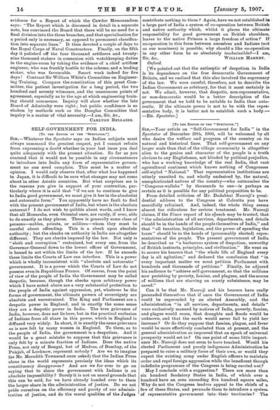ITO Tog teTTOR Or SPBCTAT08.1 Sin,—Your article on "Self-Government for
India" in the Spectator of December 29th, 1909, will be welcomed by all who desire the welfare and progress of the country on its natural and historical lines. That self-government on any- larger scale than that of the village community is altogether alien to the genius and character of the people is a truth obvious to any Englishman, not blinded by political prejudice, who has a working knowledge of the real India, that vast agricultural continent which knows nothing of Congresses self-styled "National." That representative institutions are utterly unsuited to, and wholly undesired by, the natural, unsophisticated natives of the country—who outnumber the "Congress-wallahs" by thousands to one—is perhaps as certain as it is possible for any political proposition to be.
From detailed criticism of Mr. Dadabhai Naoroji'a presi- dential address to the Congress at Calcutta you have mercifully refrained. And, indeed, the whole thing seems almost too ridiculous for serious treatment. Mr. Naoroji claims, if the Times report of his speech may be trusted, that "the administration of all services, departments, and details should be in the hands of the people themselves of India," and that "all taxation, legislation, and the power• of spending the taxes" should be in the bands of (presumably elected) repre- sentatives of the people. The present government of India he described as "a barbarous system of despotism, unworthy of British instincts, principles, and civilisation." He went on to assure his bearers that "the whole life of England every day is all agitation," and deduced the conclusion that " in every important matter we must petition Parliament with hundreds and thousands of petitions." Finally, he adjured his audience to "achieve self-government, so that the millions now perishing by poverty, famine, and plagues, and the scores of millions that are starving on scanty subsistence, may be saved."
Can it be that Mr•. Naoroji and his bearers have really persuaded themselves that if once the Government of India could be superseded by an elected Assembly, and the administration "in all services, departments, and details" were exclusively manned by natives of India, poverty, famine, and plague would cease, that droughts and floods would be unknown, and that the earth would never fail to yield her increase ? Or do they suppose that famine, plague, and fever would be more effectively combated than at present, and the general administration so improved that an epoch of universal prosperity would set in ? On one point of some little import- ance Mr. Naoroji does not seem to have touched. Would his elected Parliament and purely indigenous Administration be prepared to raise a military force of their own, or would they expect the existing army under English officers to maintain order and repel foreign aggression while the beneficent though indefinite programme of the Congress is being carried out?
May I conclude with a suggestion ? There are more than six hundred feudatory States in India, of which over a hundred have an area exceeding five hundred square miles. Why do not the Congress leaders appeal to the chiefs of a few of these States, and persuade them to introduce a system of representative government Into- their territories ? The problem would surely be much easier to solve on, a small scale and in the absence of any disturbing European element. If Mr. Naoroji could point to the successful working of a representative system in the domains of, say, the Nizam, or Sindhia, or the Maharaja of Jaipur, or the Begum of Bhopal, be could with a considerably better face ask the Government of India to resign its functions to elected national representa- tives controlling services manned exclusively by natives of the country.—I am, Sir, &c., H. C. Drina, Bengal Civil Service (Retired).















































 Previous page
Previous page